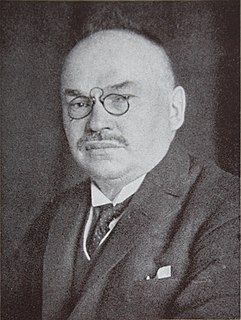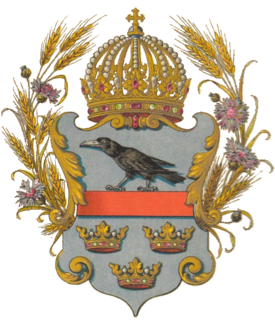
Charles University, known also as Charles University in Prague or historically as the University of Prague, is the oldest and largest university in the Czech Republic. Founded in 1348, it was the first university in Central Europe. It is one of the oldest universities in Europe in continuous operation and ranks in the upper 1.5 percent of the world’s best universities. Today, the university consists of 17 faculties located in Prague, Hradec Králové and Pilsen. Its academic publishing house is Karolinum Press. The university also operates several museums and two botanical gardens.

The Communist Party of Bohemia and Moravia is a communist party in the Czech Republic. It has a membership of 42,994 (2016) and is a member party of the European United Left–Nordic Green Left bloc in the European Parliament.

The Christian and Democratic Union – Czechoslovak People's Party (Czech: Křesťanská a demokratická unie – Československá strana lidová, KDU–ČSL, often shortened to lidovci is a Christian-democratic political party in the Czech Republic. The party took part in almost every Czech Government since 1990. In the June 2006 election, the party won 7.2% of the vote and 13 out of 200 seats; but in the 2010 election, this dropped to 4.4% and they lost all their seats. The party regained its parliamentary standing in the 2013 legislative election, winning 14 seats in the new parliament, thereby becoming the first party ever to return to the Chamber of Deputies after dropping out.

Czech National Social Party is a civic nationalist political party established in 1898 within the Young Czech Party as a nominally socialist group with a stress on achieving Czech independence from Austria–Hungary. Its best-known member was Edvard Beneš, a co-founder of Czechoslovakia and the country's second President.
This article gives an overview of liberalism in the Czech lands. It is limited to liberal parties with substantial support, mainly proved by having had a representation in parliament. The sign ⇒ denotes another party in that scheme. For inclusion in this scheme it is not necessary that parties label themselves as a liberal party.

Karel Baxa was a Czech politician in Austro-Hungarian Monarchy and then in Czechoslovakia. He is most known for his long term position as mayor of Prague.

The First Czechoslovak Republic was the Czechoslovak state that existed from 1918 to 1938. The state was commonly called Czechoslovakia. It was composed of Bohemia, Moravia, Czech Silesia, Slovakia and Subcarpathian Ruthenia.

Josef Kaizl was a well known Czech professor, economist, and politician in the Austro-Hungarian Empire. He was a member of the Imperial Council, and also Cisleithanian finance minister (1898–1899). Kaizl was leading Czech liberal politician, known for his moderate attitudes and seeking of various means to strengthen autonomous position of Bohemian/Czech lands within the Austro-Hungarian Empire. He served as the first Czech economics teacher at the Charles University. His close friends and collaborators were Jan Gebauer and Tomáš Masaryk.

Paul Gautsch Freiherr von Frankenthurn was an Austrian statesman who served three times as Minister-President of Cisleithania.
The Jewish Party was a political party of the First Czechoslovak Republic. It was founded in 1919 by the Jewish National Council in Prague. It was the strongest Jewish political party in the interwar Czechoslovakia although many Jews were rather active in non-Jewish parties, be they Czech, German or Hungarian. The party adopted a Zionist political program and succeeded in influencing the Czechoslovak government to acknowledge Jews as an official national minority in the constitution of 1920.

Legislative elections to elect members of the Imperial Council were held in Cisleithania, the Austrian section of Austria-Hungary over several days in June and July 1911. A coalition of German national and liberal parties, the Deutscher Nationalverband, emerged as the largest bloc in Parliament, holding 100 of the 516 seats. Voter turnout was 80.2%.

The Diet of the Kingdom of Galicia and Lodomeria, and of the Grand Duchy of Cracow was the regional assembly of the Kingdom of Galicia and Lodomeria, a crown land of the Austrian Empire, and later Austria-Hungary. In the history of the Polish parliaments, it is considered the successor of the former sejm walny, or general sejm of the Kingdom of Poland and the Polish-Lithuanian Commonwealth, and also of the sejmik, or local councils, in the territories of the Austrian Partition. It existed from 1861 until the dissolution of Austria-Hungary in 1918.

Legislative elections to elect the members of the 10th Imperial Council were held in Cisleithania, the northern and western ("Austrian") crown lands of Austria-Hungary, from December 12, 1900 to January 18, 1901.
In Czechoslovakia the first parliamentary elections to the National Assembly were held in 1920, two years after the country came into existence. They followed the adoption of the 1920 constitution. Prior to the elections, a legislature had been formed under the name Revolutionary National Assembly, composed of the Czech deputies elected in 1911 in Cisleithania, Slovak deputies elected in Hungary in 1910 and other co-opted deputies.

A leadership election was held within the Czech Social Democratic Party (ČSSD) on 25 March 1990. It was the first leadership election since the party's re-establishment and saw Jiří Horák defeat Rudolf Battěk. Battěk was supported by exiled politicians from the party, and wanted ČSSD to run in the 1990 parliamentary elections as part of the Civic Forum list, while Horák wanted it the party to run independently.

Legislative elections to elect the members of the eight Imperial Council were held in 1891 in Cisleithania, the northern and western ("Austrian") crown lands of Austria-Hungary. These elections were the last to occur in Cisleithania before the Badeni electoral reform, which drastically increased male suffrage.























